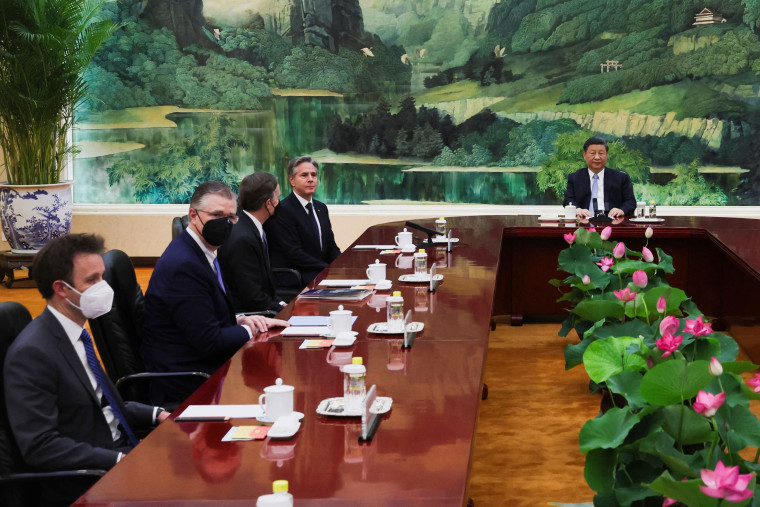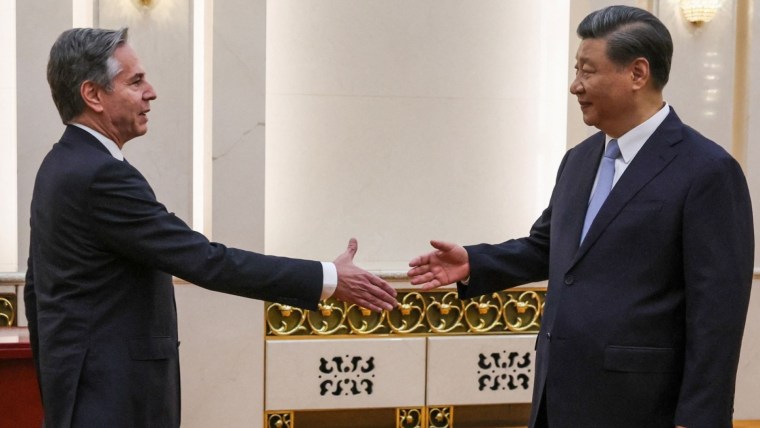
HONG KONG — China and the United States hailed “progress” and pledged to stabilize a spiraling relationship on Monday but stopped short of achieving a significant breakthrough after Secretary of State Antony Blinken met with President Xi Jinping.
The 35-minute meeting at the Great Hall of the People in Beijing, China’s capital, capped the second and final day of a high-stakes visit by America’s top diplomat aimed at easing tensions between the world’s two largest economies.
“We have no illusions about the challenges of managing this relationship. There are many issues on which we profoundly, even vehemently, disagree,” Blinken said at a news conference after his meeting with Xi.
However, he added, “it’s the responsibility of both countries to find a path forward and it’s in both our interests and the interests of the world that we do so.”
Blinken said he expected further visits to China by senior U.S. officials in the coming weeks, and that the U.S. welcomed visits from Chinese officials as well.
In remarks before their meeting, Xi said “the two sides have also made progress and reached agreement on some specific issues,” without giving details.
There was no apparent progress, however, on the restoration of several military-to-military communication channels that China cut in protest of former House Speaker Nancy Pelosi’s visit to Taiwan last August. Blinken called those communications “absolutely vital,” particularly given recent military encounters between the U.S. and China in the Taiwan Strait and the South China Sea.
“China has not agreed to move forward with that,” Blinken said.
Blinken’s trip to China is the first by a U.S. secretary of state since 2018, and he is also the highest-ranking U.S. official to visit China since President Joe Biden took office. His talks with Xi — seen as key to the trip’s success — were expected but had not been confirmed until shortly before they were scheduled to begin.
Ties between the two countries have deteriorated in recent months over trade, Taiwan, human rights, Chinese military aggression in the South China Sea and Russia’s war in Ukraine.
During the meeting with Blinken, Xi said China does not seek to challenge or displace the U.S. on the global stage, but insisted the America must respect China’s rights and interests, according to a readout from the Chinese Foreign Ministry.
For his part, Blinken denied that the U.S. is trying to contain China economically, as Xi has charged, and said Washington wanted to see economic growth in every part of the world.
“But at the same time we can, we will and we must take steps necessary to protect our national security,” he said, referring to U.S. efforts to limit China’s access to semiconductor technology, among other actions he described as “narrowly focused.”
Blinken met earlier with Wang Yi, China’s top diplomat, and with Chinese Foreign Minister Qin Gang, both of whom were also at the meeting with Xi.
State Department officials had said the two countries were unlikely to reach any breakthroughs during Blinken’s trip, which had originally been planned for February but was postponed after the discovery of a suspected Chinese spy balloon over U.S. territory.
China, while emphasizing the importance of resuming high-level communication, had also expressed less enthusiasm ahead of Blinken’s visit this week than it did before the earlier trip was postponed.
But it could lay the groundwork for talks later this year between Biden and Xi, who last met in Indonesia last November on the sidelines of a summit of the Group of 20 major economies.
After arriving on Sunday, Blinken met with Qin, China’s foreign minister, for talks that both sides described as “candid” and “constructive.” Those talks lasted for almost six hours, followed by a two-hour working dinner, according to senior State Department officials.

The two countries said Qin, who was previously the Chinese ambassador to Washington, had accepted an invitation from Blinken to visit the U.S. at a mutually suitable time.
Blinken then had a three-hour meeting on Monday with Wang Yi, China’s top diplomat, that appeared to be a little more fractious.
Wang blamed the United States’ “misperceptions” about China for the poor relations between the two countries and said Washington had to make a choice “between dialogue and confrontation, and cooperation and conflict.”
He emphasized China’s position on Taiwan, a self-ruling democracy that Beijing claims as its territory and whose status is one of the biggest flashpoints in U.S.-China relations.
China has accused the U.S., Taiwan’s most important international backer, of promoting Taiwan independence through official exchanges between the island’s president and senior U.S. officials such as Pelosi and her successor, Kevin McCarthy.
Blinken said he reiterated to Chinese officials that U.S. policy on Taiwan has not changed, while raising concerns by the U.S. and others over China’s “provocative” military actions in the Taiwan Strait in recent years.
“We do not support Taiwan independence,” he said. “We remain opposed to any unilateral changes to the status quo by either side.”
Blinken said the U.S. was prepared to cooperate with China in areas of mutual interest such as climate change, public health, food security and counternarcotics. He said he raised the issue of wrongful detentions of U.S. citizens and asked for “much greater cooperation” from China on curbing the export of fentanyl precursors that are driving the U.S. opioid crisis.
The two sides also agreed to encourage academic exchanges and business travel and to work to increase the number of passenger flights between the two countries, which are still at less than 6% their level before the pandemic.
Wang Huiyao, president of the Center for China and Globalization, a think tank in Beijing, said Blinken’s visit was a “good start” that could open the door for visits by other senior U.S. officials such as Commerce Secretary Gina Raimondo, Treasury Secretary Janet Yellen and John Kerry, the special presidential envoy for climate.
“There are a lot of complex problems that cannot all be solved in one visit,” Wang, a former adviser on the State Council, China’s top administrative body, told NBC News. “But it is certainly a step in the right direction.”
Still, the U.S.-China relationship is “clearly at an impasse” as China seeks to change the balance of power in the Asia-Pacific, said Drew Thompson, a visiting senior research fellow at the Lee Kuan Yew School of Public Policy at the National University of Singapore.
“The U.S. objective, particularly for Secretary Blinken’s visit, is to manage competition and avoid conflict,” said Thompson, a former Defense Department official. “But China has a different set of objectives, which is to exert its authority and its power so that it becomes the dominant political and economic power in the region, and that’s going to come at the expense of U.S. interests.”

 Latest Breaking News Online News Portal
Latest Breaking News Online News Portal





